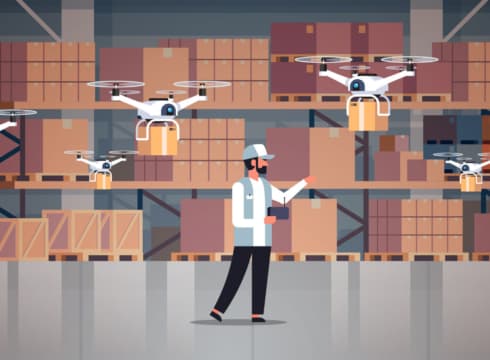The drone industry in India is growing rapidly and has the potential to become a global hub, with projected manufacturing potential estimated to reach $23 Bn by 2030
Homegrown drone manufacturing can generate employment opportunities, save on production costs, and provide an opportunity for developing skills across industries
The drone industry can also create customised solutions to meet the needs of different landscapes, and the technology developed for drone manufacturing can be applied to other industries as well
Inc42 Daily Brief
Stay Ahead With Daily News & Analysis on India’s Tech & Startup Economy
There is a roar in the Indian skies, and it’s not just the sound of aircraft passing by. Drones have taken to the air and are revolutionising industries across different verticals. These unmanned aerial vehicles (UAVs) are transforming the way businesses operate, from agriculture to construction to ecommerce.
With the potential to save time, money, and resources, drone technology is becoming increasingly popular among industries looking to increase efficiency and productivity. In line with the ‘Aatmanirbhar Bharat’ initiatives, the Indian government has recognised the potential of the drone industry and taken proactive measures to promote homegrown manufacturing and reduce dependence on imports. The introduction of digital airspace mapping for drones, along with the announcement of initiatives such as Drone Shakti and Kisan drones, has been lauded as a step in the right direction by industry leaders.
In the latest report by EY-FICCI, titled “Making India the drone hub of the world,” the projected manufacturing potential of India’s drone industry is estimated to reach approximately $23 Bn by 2030. The report proposes that, with appropriate manufacturing and investments, India has the potential to become the world’s drone hub by 2030. Given the growth potential, it is imperative to assess the implications of homegrown manufacturing on other sectors.
Generating Supply Faster
The development of an indigenous manufacturing industry represents a formidable solution to the escalating need for drones in multiple sectors, encompassing agriculture, disaster management, healthcare, security and others.
The implementation of faster supply chains through the deployment of drone delivery systems can efficaciously diminish the turnaround time for emergency deliveries, thereby enhancing operational potency for commercial entities. This simultaneously has the potential to augment the country’s economic growth, providing a significant impetus to its overall development.
Saving Costs For Manufacturing
Another key advantage of homegrown manufacturing is that it saves on production costs. India can leverage its lower labour costs and high-quality talent pool to manufacture drones and its components at a much lower cost compared to importing them from other countries. This would also help to keep its prices affordable for the sectors in which they are applicable.
Skill Development In The Industry
Homegrown manufacturing will provide an opportunity for developing skills across industries. This will help create a new workforce with specialised skills in drone usability, operations and servicing.
The industry can also leverage the sectorial expertise of other industries through collaborations to boost the skills of the workforce in drone manufacturing. This will help in developing more industry-centric drone products that are tailored to specific needs.
Employment Generation
Inhouse manufacturing has the potential to generate significant employment opportunities. As per the pronouncement of the Union Minister for Civil Aviation Jyotiraditya Scindia, India’s drone industry can generate 15,000 job opportunities in manufacturing and over 5 Lakh job opportunities in the next three years. This can also provide a major push for the country’s economy and improve the standard of living for many Indians.
Solutions Can Be Used For Different Sectors
The drone industry’s growth potential is not limited to drone manufacturing alone. The solutions developed for manufacturing can be used in other industries as well.
For instance, the hardware and software solutions used in drone manufacturing can be applied to sectors such as defence, logistics, and transportation. This can help create a more diversified industry ecosystem that is not solely reliant on the drone industry.
Technology Creation According To Geography
India’s diverse geography presents a unique set of challenges as well as opportunities for the drone industry. The country’s varying terrains, weather conditions, and infrastructural limitations make it necessary to create and diversify technology according to the different regions.
By developing drone technology suited to India’s geography, the drone manufacturing industry can provide customised solutions to meet the needs of different landscapes.
Conclusion
The domestic drone manufacturing industry in India harbours immense potential for exponential expansion, and the country is taking substantive measures to capitalise on this opportunity.
Nevertheless, achieving the ambitious mission of establishing India as the global drone hub by 2030 will necessitate a synergistic approach from all stakeholders. The formulation of robust strategic blueprints is imperative to stimulate manufacturing, galvanise investments, and facilitate exports to achieve this shared objective.
{{#name}}{{name}}{{/name}}{{^name}}-{{/name}}
{{#description}}{{description}}...{{/description}}{{^description}}-{{/description}}
Note: We at Inc42 take our ethics very seriously. More information about it can be found here.


